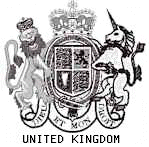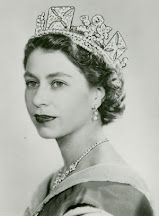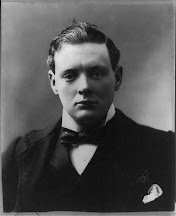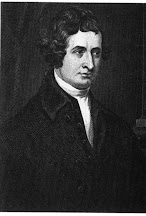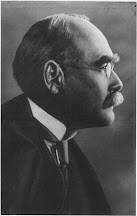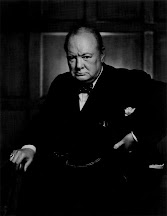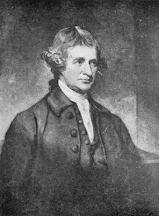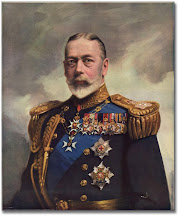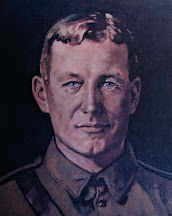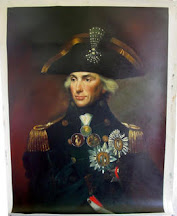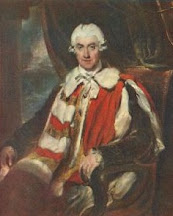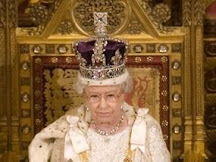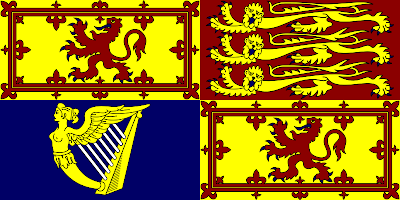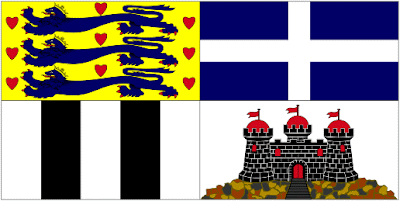Sixty Joyless De-Britished Uncrowned Commonpoor Years (1949-2009)
Britannic Inheritance: Britain's proud legacy. What legacy will America leave?
English Debate: Daniel Hannan revels in making mince meat of Gordon Brown
Crazy Canucks: British MP banned from Canada on national security grounds
Happy St. Patrick's: Will Ireland ever return to the Commonwealth?
Voyage Through the Commonwealth: World cruise around the faded bits of pink.
No Queen for the Green: The Green Party of Canada votes to dispense with monarchy.
"Sir Edward Kennedy": The Queen has awarded the senator an honorary Knighthood.
President Obama: Hates Britain, but is keen to meet the Queen?
The Princess Royal: Princess Anne "outstanding" in Australia.
H.M.S. Victory: In 1744, 1000 sailors went down with a cargo of gold.
Queen's Commonwealth: Britain is letting the Commonwealth die.
Justice Kirby: His support for monarchy almost lost him appointment to High Court
Royal Military Academy: Sandhurst abolishes the Apostles' Creed.
Air Marshal Alec Maisner, R.I.P. Half Polish, half German and 100% British.
Cherie Blair: Not a vain, self regarding, shallow thinking viper after all.
Harry Potter: Celebrated rich kid thinks the Royals should not be celebrated
The Royal Jelly: A new king has been coronated, and his subjects are in a merry mood
Victoria Cross: Australian TROOPER MARK DONALDSON awarded the VC
Godless Buses: Royal Navy veteran, Ron Heather, refuses to drive his bus
Labour's Class War: To expunge those with the slightest pretensions to gentility
100 Top English Novels of All Time: The Essential Fictional Library
BIG BEN: Celebrating 150 Years of the Clock Tower
Sunday, 30 November 2008
Wednesday, 26 November 2008
A Whig's Perspective
Good day to all you fine, discerning gentleman and ladies here at the Monarchist. I am a new scribe here, and I have written this article as a way of introducing myself. You may call me Gladstone. Not only that, but I would like to introduce my beliefs in this article, so that none of you excellent Tories will be surprised by my decidedly Whig perspective.
I am a Progressive, a Leftist, a Liberal, and a Whig. With all that, you'd expect that I'd be firmly against Her Majesty the Queen, correct?
No. No, I am a most loyal Canadian subject of Her Majesty the Queen. In fact, I sing God Save the Queen every day while going about my morning routine. I have been this way since a young age (though some would argue I am still at a young age, but I digress). If I could have Red Ensign bed sheets, I probably would. If I could change the Canadian anthem from the overly neutral O Canada to the more patriotic Maple Leaf Forever, of course I would. I love Her Majesty, and I love my English heritage, and I love my Canadian homeland, and I love this great British Commonwealth of which we all belong.
So how is this so? You will find many Whigs these days to be odious republicans (The political belief, not the American political party, of course). Hopelessly idealistic egalitarians, or staunch democrats who can't stand the mere idea of having a dignified part of government, set above the unwashed masses. The heirs of Woodrow Wilson, the Great Idealist himself. Many of them are just Dennis Skinner-type working class buffoons with no reverence for the Crown that has lasted for nearly a thousand years. Proletariats rising against their, quote-unquote, “oppressors”, Marx would be proud. On a related note, Dennis Skinner is one of my all-time most hated MP's ever. I will tell you why. It's because, despite my leftism, I am a proud and unabashed elitist. As the eloquent scribes here at the Monarchist put it: “Equality be damned!”
Oh, I am no racist, nor sexist, nor homophobic. My elite is not based on things that do not matters, not based on things a person has no control over. The noblesse, to me, are those who strive to do better than their peers. And we will always have those people, who elevate themselves and their families above the unwashed masses. Hereditary titles, like the noble Peerage of the United Kingdom, are continuing honouring of a man's deeds, by acknowledging those descent from him. Her Majesty, our fount of honour, is a living acknowledgement of William the Conqueror's prowess and ambition. That is my elite, not based on any race, gender or sexual preference, but on your quality and that of those who came before you. Is that elitist? Indeed so, and I embrace it.
This is why I support Her Majesty and the House of Windsor. They are the dignity of Britain and it's Commonwealth. In addition to the great services they provide as a national symbol (far superior to any mere flag), a unifying force, as diplomats, in the case of the Princes, soldiers, and the historic British championing of minority rights, they are the source, the fount of honour, of dignity in government. Pomp and splendour, they lend magnificence to matters of government. Can anyone truly compare a Presidential inauguration motorcade to Her Majesty's coronation? I think not. The pros they provide far outweigh the cons, or the possible pros of discarding them. Some other nations tell us to 'grow up' and force Her Majesty to abdicate. How is it grown up to reject a magnificent tradition? Is the mindless rebellion of an angry teenager throwing a fit against his or her parents 'grown up'? Most would say no. Then why is it grown up to discard a tradition that has done nothing but good for Britain and the Commonwealth? I say: God Save our Queen, God preserve the Windsors, and the Maple Leaf Forever!
-Gladstone
Read the full article >>
Sunday, 23 November 2008
The Wrinkles of Centuries
While reading J.K. Baltzersen's post on Queen Maud of Norway, as well as noticing that rather striking portrait of our future sovereign in the headers celebrating his 60th birthday, I began to ponder the question of dynasty. Victor Hugo, who was himself a republican but not overtly hostile to crowned institutions, observed in Les Miserables:
But it is not always easy to create a dynasty. At a pinch any man of genius, or even any soldier of fortune may be made into a king. Bonaparte is an instance of the first, and an instance of the second is Iturbide, the Mexican general who was proclaimed emperor, deposed in 1823, and shot the following year. But not any family can be established as a dynasty. For this some depth of ancestry is needed: the wrinkles of centuries cannot be improvised.I am a monarchist by tradition. It is the tradition of my country, Canada, to have a monarchy. Historically monarchies have been more stable and humane institutions than their republican competitors, the only really successful republics in history are the Roman, the Swiss, the Dutch (which is today a monarchy) and the American. Most republics have been disasters. The French Republic - now on version 5.0 - survived into the second half of the twentieth century largely because of the efforts of one man, Charles de Gaulle, whom many called an uncrowned king in his dozen years as President. Why are most republics such spectacular failures? The modern world affords many examples of stable democratic republics, South Korean, Germany, Italy, Portugal, Greece and most of the states of Eastern Europe. Notice, however, that none of these republics have strong liberal democratic traditions dating before 1945, most were dictatorships of one variety or another as late as the 1970s or 1980s. None, importantly, have faced a grave military or economic crisis and should - forbid the thought - the world undergo another Great Depression I cannot see many standing for very long.
The period between 1929 and 1932 signalled the end of what has been called the first era of globalization, it was also the end of the first era of global liberalism, in the broad and original understanding of that word. Poverty and crisis overwhelmed the feeble republics of Europe and Latin America. Among the republican states only Switzerland, France - barely - and America survived. The stability of the House of Windsor, and the houses of Scandinavia, were never questioned. The secret is not, I think, really monarchy but something we sometimes miss here at the Monarchist, dynasty. Lloyd George, no friend of the peerage or the crown, once remarked about the House of Lords:
There are no credentials. They do not even need a medical certificate. They need not be sound either in body or mind. They only require a certificate of birth just to prove that they were the first of the litter. You would not choose a spaniel on those principles.Too clever by half, as Lloyd George often was. The first of the litter doesn't seem an inspired method of selection, and it goes as much for monarchs as for peers. Yet it works well. An inherited position, especially of great wealth, mitigates corruption or ambition. A politician has the perspective of a few years between elections, and he is always fund raising. A monarch, or one in waiting as Prince Charles, must take the perspective of centuries. Unlike private wealth, which may come without responsibility, the wealth and glory of a monarch in a modern liberal democracy does not. The Queen and the Prince of Wales are among the hardest working people in the United Kingdom, enduring a schedule as brutal as that of many cabinet ministers or top executives. To whom much is given, much is expected.
It instills a sense of duty and public service, in the older meanings of those words. Today duty is seen as a thankless task performed with reluctance. Public service a code word for subservience to an over mighty state. No sane man would wish to be King, but having been placed in that line of fate, awesome even in a constitutional state, the opportunity to make an impact on the world is still great. It is this perspective, the wrinkles of centuries, that gives a monarchy its flavour and grandeur. To have lasted so long does not guarantee goodness, but it suggests that an institution has spoken to some deep desire and need of the human race. We ignore this truth at our peril. Those eager to replace the House of Windsor, and the personal union of Her Majesty's 16 Commonwealth realms, with some kind of crowned republic are pursuing an, at best, foolish, and often dishonest strategy. Crowned republic is another way of saying republic later. Any soldier of fortune can be made a king, or in our more stable times any patronage appointment can be made a king.
We too, in Canada, Australia and New Zealand can have some bloodless head of state like Italy or Israel, a nonentity plucked from obscurity to shake hands with foreign diplomats, a figure too weak and irrelevant to challenge an overly ambitious minister of state. A monarch like our current sovereign is not crossed lightly. She has seen too much and been enough away from the fray of politics, a detached and largely impartial observer, not to have learned much. We do not know what she thinks. We are fairly certain she was no fan of Mrs Thatcher, but very much liked Mr Wilson and Mr Major. Yet government worked as smoothly as ever. It was headlines when the Queen was alleged to have reprimanded Mrs Thatcher for being "uncaring," yet Thatcher could not - whatever the rightness of her cause - ignore the crown with impunity. Even a constitutional monarch who reigns more than rules, provides a valuable check on the power of her ministers. A monarch who was made a monarch by chance, by political whim or election, is a feather in the breeze. A dynasty is something not to be trifled with.
The Gods of the Copybook Headings
Read the full article >>
Thursday, 20 November 2008
In Memory of Maud of Wales
It was November 26, 1869. A Princess was born to Prince Albert Edward, the Prince of Wales, later Edward VII, and Princess Alexandra, the Princess of Wales. The newborn Princess was Maud Charlotte Mary Victoria of Wales.As such she was a granddaughter of Queen Victoria, the grandmother of Europe. It was a time when non-morganatic marriage was not only the norm, but a strict norm. Archduke Franz Ferdinand, who saw his last day in Sarajevo on June 28, 1914, could not let the throne pass to his children with his consort Sophie, who was only of aristocratic blood. She was a mere noblewoman. It was a time when royals marrying consorts of the lowest order – with “pasts” – was unthinkable, save for the most extremely vivid imaginations.
Princess Maud of Wales was born in the year Royal Assent was given to annual ordinary sittings of Parliament in the country she was to become Queen Consort. In the year she turned two years old, annual sittings came into effect. Previously, ordinary sittings had been every third year. She was born before parliamentary government was very much an issue in the country she was to become Queen Consort.
On July 22, 1896 Princess Maud of Wales married Prince Carl of Denmark. On July 2, 1903 the marriage was blessed with Prince Alexander – later Crown Prince Olav and King Olav V of Norway.
It was in an age when dissolved unions and independence gave states that sought kings of their own. It was in an age when the default form of government was monarchy. It was in an age when nations that sought to establish a form of government sought to establish a monarchy. It was in an age when the revolutionary republic was the only republic besides the ancient republic of the Helvetic Confederation among the major states of Europe. The revolutionary republic was looked upon with suspicion, and rightly so.
The powers of Europe, the revolutionary republic included, wanted Norway to retain her monarchy.
It was time when the ancient Kingdom of Norway, so often erroneously referred to as a new monarchy, sought a King of her own.
There was a referendum on whether to consent to the Norwegian Parliament – the Storthing – inviting Prince Carl of Denmark to ascend the vacant, ancient throne of St. Olav. This referendum is so often referred to as a referendum over the issue of monarchy vs. republic. 79 % consented to make Prince Carl King, and thus to make Princess Maud Queen Consort of Norway.
Prince Carl was proclaimed King on November 18, 1905, upon which Princess Maud became Queen Consort of Norway. Having taken the name Haakon VII, the new King came with his Queen Consort and Crown Prince Olav on a cold winter day, November 25, 1905, to the Norwegian capital of Christiania.
The Danish Prince had been selected to ascend the throne of St. Olav due in large part to his status as son-in-law of His Britannic Majesty King Edward VII. Building an alliance through relations of one's royalty was important. Such was this age.
King Haakon and Queen Maud were crowned in Trondhjem on June 22, 1906. A post-coronation photo taken in the local royal residence with robes and regalia reportedly prompted His Britannic Majesty to report back that his daughter and son-in-law suited the outfits well. In the wake of the coronation, the King and Queen traveled their Kingdom. In the city of Haugesund the dessert Queen Maud Pudding was composed to His Britannic Majesty's daughter's honor. The dessert is popular at weddings and other occasions till this day.Whilst accepting popular sovereignty, whilst being much less publicly confrontational than his predecessor, King Oscar II, whilst seeing himself as significantly less a power in his own right than his predecessor, King Haakon VII did have ambitions of being something else than a marionette of the politicos. There was a struggle. His Majesty once commented that a handkerchief was something he was allowed to poke his nose in. By his side was Queen Maud.
The republican politicos who brought the new King and his Consort, Maud of Wales, to the land had other plans than the country to remain a monarchy. They wanted to use him as security in the beginning and later dump him for a republic. His Majesty was to reign for almost 52 years – well into the democratic republican age.
Queen Maud visited the land of her birth quite often. She attended the latest coronation of a King in Westminster Abbey, that of His Britannic Majesty King George VI, Her Majesty Queen Maud's nephew. That was to be her last public appearance in the United Kingdom. She passed on on November 20, 1938, 70 years ago today, less than 17 months too early to be at King Haakon VII's side when his Kingdom suffered the consequence of the politicos not following Majestic advice about defense level.
Queen Maud is laid to rest with King Haakon VII, who survived his consort with almost 19 years, in the Royal Crypt in Oslo.
The widower King Haakon VII boarded HMS Devonshire on June 7, 1940, bound for London, which was to be the capital of the Kingdom of Norway for just about five years. The King, with few exceptions, met with and chaired his Cabinet every Friday for about five years in what was then the official Royal seat, the Royal Norwegian Embassy, today's Ambassador's residence, close to Kensington Palace.
The Norwegian Government today has this historic building in its possesion, but has let the Cabinet offices from the WWII years go.
As an uncle-in-law of His Britannic Majesty, King Haakon stayed mostly at Windsor Castle. His Majesty's 70th birthday was celebrated in Royal Albert Hall. His Majesty served as a symbol of liberation through the war years, and his voice was welcomed on all the "illegal" radios around the occupied land. King Haakon's popularity outclassed what was thought of the politicians who served as his Cabinet Secretaries. At the end of the war, there were voices speaking up for more regal powers, notably that of Johan Scharffenberg, a man who had pushed for a republic back in 1905.
Queen Maud Land in the Antarctic is the largest Antarctic claim, a Norwegian dependency. It was recognized by the United Kingdom and His Britannic Majesty's dominions of Australia and New Zealand.
Queen Maud Mountains in Antarctica are also named after Maud of Wales. So is Queen Maud Gulf in Nunavut in Her Britannic Majesty's Kingdom of Canada. There is also the Queen Maud Secondary School in Hong Kong.
Maud of Wales may have had a back seat in history compared to King Haakon VII. However, without Maud of Wales there probably would not have been a King Haakon VII, and we certainly would not have had King Olav V, whose subject yours truly was born.
The relations between the House of Windsor and the House of Norway are stressed from time to time, realtions which make yours truly a subject of a great-grandchild of Edward VII.
We honor the memory of Maud of Wales on this 70th anniversary of Her Majesty's passing.
Read the full article >>
Sunday, 16 November 2008
Ranch Republican or British Monarchy?
We remember the wars, the five trillion dollars in added American debt and the calamities that bookend the Dubya years. But the English-speaking gentleman did not truly become aghast until that unforgettable summer day in 2007 when Her Majesty came to Washington on one of her rare state visits to the Capitol. How not to wear white tie, courtesy of George W. Bush:
How not to wear white tie, courtesy of George W. Bush:
1. The waistcoat should never extend below the bottom of the tailcoat.
2. The shirt collar must be a wing collar.
3. The trousers are to be worn at the waist, not slung down around the hips.
4. The shirt sleeve should have at least 3/4" of cuff. (To be fair, Prince Philip is equally guilty of this particular faux pas, but you didn't read that at The Monarchist. By the way, what do you suppose our Grand Old Duke is thinking as he sets his eyes on Dubya?)
5. Also, avoid goofy laughter in the presence of Her Majesty The Queen.
From The Black Tie Guide, A Gentleman's Guide to Evening Dress. (Except for number five which is mine).
Read the full article >>
Wednesday, 12 November 2008
High Anthony
 Did Drinamyl, a combination of amphetamines and barbiturates, destroy the British Empire? Or at the very least impair the judgment of its Prime Minister, during one of the gravest moments in British history? In a new book David Owen, a physician and one of the youngest foreign secretaries in history, traces the influence of illness in the personal judgment of various world leaders, including one of his predecessors, Sir Anthony Eden. Blessed with matinee idol good looks, a fine sartorial style and impeccable manners, Eden served three times as Foreign Secretary, and was Churchill's closest ally and lieutenant during his two terms as Prime Minister. Widely popular in the country, and generally respected as one of the century's most effective foreign secretaries, he succeeded Churchill as Prime Minister in April of 1955 with great promise; quickly calling and winning a snap election. In a little more than a year and a half he was out of office, forced out by ill-health and one of the greatest foreign policy blunders in the country's history.
Did Drinamyl, a combination of amphetamines and barbiturates, destroy the British Empire? Or at the very least impair the judgment of its Prime Minister, during one of the gravest moments in British history? In a new book David Owen, a physician and one of the youngest foreign secretaries in history, traces the influence of illness in the personal judgment of various world leaders, including one of his predecessors, Sir Anthony Eden. Blessed with matinee idol good looks, a fine sartorial style and impeccable manners, Eden served three times as Foreign Secretary, and was Churchill's closest ally and lieutenant during his two terms as Prime Minister. Widely popular in the country, and generally respected as one of the century's most effective foreign secretaries, he succeeded Churchill as Prime Minister in April of 1955 with great promise; quickly calling and winning a snap election. In a little more than a year and a half he was out of office, forced out by ill-health and one of the greatest foreign policy blunders in the country's history.
Gamal Abdel Nasser, the opportunistic young military office who helped overthrow the Egyptian monarchy, only to then seize power for himself. Seeking to consolidate his power, both in Egypt and establish his credentials as the leader of the Arab world, he seized control of the Suez Canal. The proximate cause was the refusal by the American government to finance construction of the proposed Aswan Dam, later built with Soviet assistance. Nasser's long-term goal was the removal of British influence in the Middle East, replacing its near century long hegemony with an Egyptian one. Although built by French engineers, the majority of the shares were owned by the British government, thanks to the quick thinking of Disraeli and his friends in the Rothschild banking family during a financial crisis in 1875.
To Eden, who had resigned as Foreign Secretary in 1938, in part, because of Neville Chamberlain's policy of appeasement, Nasser was a latter day Mussolini and nationalization, something akin to the invasion of Ethiopia in 1935. President Eisenhower, and his usually bellicose Secretary of State John Foster Dulles, saw the Suez Crisis differently. Supporters, in principle, of decolonization and keen to supplant British influence in the oil rich region, the American government refused to support military action. It was at this moment that Eden, arguably, committed one of the gravest strategic errors ever made by a minister of the crown. Overestimating the importance of the special relationship in Eisenhower and Dulles calculations, and Britain's comparative economic strength, he launched a plan of subterfuge remarkable for both its scale and complexity.
British, French and Israeli representatives meet in secret at Sèvres, near Paris, and agreed that Israel should invade the Sinai. Using this as a pretext an Anglo-French force would invade and seize the canal, arguing that it was attempting to keep apart the warring parties. The protocols of Sevres, as they became known, recalled the Great Power deals of a different era, like the Sykes-Picot Agreement which divided the Middle East between Britain and France during World War One. 1956 was the era of the Superpowers; Britain and France were now firmly in the American orbit. The deception of Sevres was too convenient and complex not to be discovered. In a less democratic and, from geopolitical perspective, bi-polar world this might not have been a problem. Eisenhower, fearing a Soviet response and greatly annoyed for having been kept out of the loop by Eden, forced London and Paris to agree to a cease-fire and withdraw. Eden had gambled that Nasser's flirtation with the Soviets would compel Washington to accept, if none too happily, an Anglo-French fait acompli over Suez. Instead Eisenhower threatened to, literally, starve Britain into submission if it did not agree to an American cease-fire plan. Much of Britain's war debt was held by the American treasury, Eisenhower threatened to dump enough of this debt on world markets to force a collapse in the pound. A nation dependent on imports of food to survive, Britain would be unable to feed itself. Eden, from force majeure conceded and went to seek medical treatment.
During the tense months of Summer and Autumn 1956, Anthony Eden stood at the center of Anglo-French efforts to retake the Canal. Had he been able to persuade Eisenhower to, at the very least, not interfere in his efforts to undermine Nasser, there would have been no Suez Crisis as we understand it. The retaking of the Canal would have been a dramatic coup for Eden and Britain and probably would have broken Nasser's power. When an elected Persian government nationalized its oil industry, Britain responded by orchestrating a coup - in conjunction with the CIA. Having successful defied a major western power, something no Arab leader had done in centuries, Nasser became a regional hero and icon for decades. Emboldened by Egypt's success a wave of nationalizations swept the Middle East, granting the region's dictatorships a flood of oil wealth to sustain their regimes.
If the sin of Suez lies with Washington, for failing to support British efforts, the error of the crisis lies with Eden, for miscalculating American and, to a lesser extent, Commonwealth support. Neither proved willing to follow London's, and his, lead. Owen points to a medical reason for Eden's poor judgment, a combination of prescription drugs required to deal with a recurring infection, itself the result of a botched surgery to remove gallstones. A slip of a doctor's scalpel may have altered the course of history for the worse. The counter argument to this is that nothing, not even Eden's considerable powers of persuasion, could have convinced Eisenhower to support a military retaking of the Canal. He might, however, in the fashion for which Dulles brothers (John Foster's brother ran the CIA) were well-known even then, have orchestrated a coup against Nasser. The Egyptian dictator was extremely popular, but so was the Iranian government the CIA had overthrown less than three years earlier. Over the long-run, however, Eden looks the most prescient. If Nasser was no Mussolini in the making, the failure of will at Suez established a de facto policy of appeasement toward the Arab world. Two years after Suez the Iraqi monarchy, a British puppet, fell to an Army coup, a military regime was installed and later taken over by Saddam Hussein.
The Gods of the Copybook Headings
Read the full article >>
Tuesday, 11 November 2008
Armistice Day, 1918
(click on the photo to enlarge)
Read the full article >>
Their Name Liveth Forevermore
At the 11th hour, the 11th day and the 11th month, the guns fell silent 90 years ago today. Abide With Me, O Valiant Hearts. At the going down of the sun and in the morning, we will remember them.
Read the full article >>
Saving the Aerodrome of Democracy
F.D.R called Canada the Aerodrome of Democracy for its massive undertaking and central responsibility for flight training of pilots and aircrew from all across the British Empire during the Second World War. Unfortunately we now learn that 447 Wing, the last of the so-called "H-huts", is facing the axe from its apparently ungrateful host. "HAMILTON — Real Second World War history is a messy business, soaked with blood, sweat and countless spilled beers. And so it is at 447 Wing, also known as the last of the “H-huts.”
Here, at the edge of Hamilton Airport, you enter a time capsule where you can blink your eyes and find yourself in 1942. The bar rail is dented by boots that worked the rudder pedals of Spitfires and Lancasters, and the walls are hung with squadron insignias and photographs of young Princess Elizabeth.
The clientele is vintage too – some of the men who come here for a quiet drink have been regulars for close to 70 years..."
Read the full article >>
Monday, 10 November 2008
Reflections
(Linked from The Soaring Eagle)
I had some time to reflect on things today, and a passage from Shakespeare came to me: "Uneasy lies the head that wears the crown." It is a passage from Henry IV, in Part II, and possibly one of the most straightforward quotations of Shakespeare's work. Or so we assume, anyway.
I say this because I realized a deeper meaning while reflecting on this passage. Is the head uneasy because it wears the crown, or because of the typical symbolism of thereafter responsibility?
Most people would claim that it is a simple symbolism for the responsibility that a man at the top feels weighing down on him. However, that's an overly simplistic view of the situation. Every person feels weighed down with responsibilities, no matter their station in life. Rather, it seems to me that the true weight of the crown, the weight that makes the king feel uneasy, is rather the fact that he must do so alone.
The eagle that flies highest is always alone.
That simple realization made me reaffirm my commitment to the Monarchist cause, and indeed, it has made it all the stronger. Thanks to that reflection, I understand now that the real weight on the shoulders of the monarch is the fact that they have no one else to help them carry it. For that reason, I say now that no one who has not felt the despair of true loneliness has any right to criticize those who accept the weight for the sake of letting no one else have to go through it.
We often state the extensive media exposure of the Royal Family as a downside to their job, and indeed, that is true. However, perhaps it is also through that media exposure that we can understand just how alone they must feel. When the Queen, or any of her family for that matter, greet the people outside their lavish palaces, do they seem barely tolerant, or truly happy? When Prince Harry visits his charity projects, does he act cold and aloof (as one might suspect a pampered prince to behave), or does he interact with the children and look happy as he does?
Why is that happiness so apparent, we must ask. Kings and Queens have always had the unspoken right to be dismissive and aloof, but these princes and princesses seem to love the interaction with their people, more than they do the return trip to their palaces. What else could explain it but the joy of being recognized and thanked for their unspoken work? For carrying that burden of solitude most other people would be crushed under? I say again,
The eagle who flies highest is always alone.
Read the full article >>
Sunday, 9 November 2008
We Will Remember Them
A WAR FILM, by Teresa Hooley (b. 1888)
I saw,
With a catch of the breath and the heart’s uplifting,
Sorrow and pride,
‘The week’s great draw’ -
The Mons Retreat;
The ‘Old Contemptibles’ who fought, and died,
The horror and the anguish and the glory.
As in a dream,
Still hearing machine-guns rattle and shells scream,
I came out into the street.
When the day was done,
My little son
Wondered at bath-time why I kissed him so,
Naked upon my knee.
How could he know
The sudden terror that assaulted me?...
The body I had borne
Nine moons beneath my heart,
A part of me…
If, someday,
It should be taken away
To War. Tortured. Torn.
Slain.
Rotting in No Man’s Land, out in the rain -
My little son…
Yet all those men had mothers, every one.
How should he know
Why I kissed and kissed him, crooning his name?
He thought that I was daft.
He thought it was a game,
And laughed, and laughed.
Read the full article >>
Thought Showers Grip Bournemouth
The verbal Jacobins are at it again. The town council of Bournemouth, Dorset, has banned the use of Latin words and phrases in official documents and communications. There is no talk yet of changing the town motto, Pulchritudo et salubritas. Latin, says the local politicos, is a dead language that few can understand. This monumental bit of historical and cultural revisionism has caught the ire of many who, rightly, see it as an attempt to modernize away British heritage. So blatant and absurd is the policy that even the Daily Mail, scarcely the paper read by Oxbridge Dons, is opposing the policy with the headline: Si fractum non sit, noli id reficere
In a staggeringly philistine move, the council has just listed 19 Latin terms it no longer considers acceptable for use, including five of the expressions I used in the opening paragraph (see if you can spot them). Come to think of it, they probably wouldn't be very keen on the word philistine either - it comes from a Latin word, philistinus, which refers to an ancient tribe in Israel, who were considered particularly primitive. Not nearly as primitive as the idiots of Bournemouth Council, though. Every single one of the 19 terms they have banned have become so embedded in our language that they have, quite literally, become English. Yes, you will find vice versa, ad lib and bona fide in a Latin dictionary, but you will also find them in an English dictionary. Banning them is the same as banning English words - because that is precisely what they are.I'm reminded of the Evelyn Waugh novel, Brideshead Revisited, where the main protagonist, Charles Ryder, reflects on the generation coming of age in 1945, in particular the hapless young Lt. Hooper.
Hooper was no romantic. He had not as a child ridden with Rupert's horse or sat among the camp fires at Xanthus-side; at the age when my eyes were dry to all save poetry - that stoic, redskin interlude which our schools introduce between the fast flowing tears of the child and the man - Hooper had wept often, but never for Henry's speech on St Crispin's day, nor for the epitaph at Thermopylae. The history they taught him had few battles in it but, instead, a profusion of detail about humane legislation and recent industrial change. Gallipoli, Balaclava, Quebec, Lepanto, Bannockburn, Roncevales, and Marathon - these, and the Battle in the West where Arthur fell, and a hundred such names whose trumpet-notes, even now in my sere and lawless state, called to me irresistibly across the intervening years with all the clarity and strength of boyhood, sounded in vain to Hooper.It isn't that the Hoopers are in control, their grandchildren are in control. This is a bleaker prospect still than the one Waugh faced. There may have been "few battles" in Hooper's education but he had some exposure to traditional pre-1960s culture. The Drones of Bournemouth have no such advantage, or restraint. The council of Tunbridge Wells recently suggested banning the use of the phrase "brainstorm" because it might be offensive to people with epilepsy. I suspect only those who also suffer from a severe bout of modern education would object.
Crossposted at The Gods of the Copybook Headings
Read the full article >>
Saturday, 8 November 2008
Fox Hunting more Popular than Ever
More than 80 landowners, including the Duke of Norfolk, are to renew a legal attempt to ban hunt protesters from private estates.
Police are seeking greater access to hunts to prevent the four-year-old ban being flouted amid a surge of interest in the pursuit.
Since the ban came into force on 18 February 2005, the number of hunt members has increased by about 5,000, with about 50,000 regular riders, while the number of people watching the hunts has grown to 120,000. Total turnover of the hunts has grown from £155 million a year before the ban to at least £170 million.
The hounds are baying, the horses are stamping their hooves and the port is being passed around at Puckeridge Hunt. How's that, you ask?
Read the full article >>
Thursday, 6 November 2008
The Courageous Royal Gurkha Rifles
The Gurkhas earned their right to stay in Britain long ago, yet they were only granted this right recently. Better late than never I suppose. Members of the Gurkha Rifles display the Military Crosses presented to them by The Queen at an Investiture ceremony at Buckingham Palace, 4 November 2008. The soldiers were honoured for courageous service in Afghanistan.
© Press Association
Read the full article >>
Wednesday, 5 November 2008
His Mightiness Confounds
Well, some people aren't confounded. Besides the commenters, Peter Hitchens has some pretty strong views: The night we waved goodbye to America... our last best hope on EarthNow that Barack Hussein Obama has been democratically proclaimed His Mightiness Elect of the world, courtesy of the people of the United States, we should wonder how such a man managed to confound so many people, so many conservative-minded people.
When the supposedly Tory Mayor of London, Boris Johnson, enthusiastically endorses him we can chalk this up to be nothing more than pure political calculation (he is Mayor of London after all, how many Londoners were supporting McCain do you suppose?). But when a former Ronald Reagan speechwriter supports him because he believes him to be an honest to goodness Burkean, what is it about this man that confuses people?
Who is this man, anyways? Is he a progressive or a Burkean? Is he a Muslim or a Christian? Is he a hawk or a dove? Based on his parentage, can we even really say he is black or white? On almost any question, the man confounds.
There is one thing that everyone can agree upon, however, and that is his oratorical mastery. He is right up there with Martin Luther King and Malcolm X, the man can deliver a speech in the evangelical American tradition where such speech-giving has been historically cultivated.
Remember, we don't produce such men because we come from a different tradition, and have a completely different political culture. I don't think Obama's skills would shine through in Parliament, Westminsterism has a way of putting you in your place. In a politician's republic, there is nothing that puts you in your place. You have the ability to become something of a God to the masses. We are witnessing such a moment tonight.
Read the full article >>
Tuesday, 4 November 2008
Her Majesty Honours Canada's War Dead
Canada's high commissioner to the UK described the Queen's tribute in London as a touching moment. “It was extremely moving watching the names scroll down very slowly ... there was absolute silence,”  The Queen honoured Canada's war dead from the Great War today as a high-tech vigil paying tribute to some 68,000 fallen Canadians flickered onto a wall in London's celebrated Trafalgar Square.
The Queen honoured Canada's war dead from the Great War today as a high-tech vigil paying tribute to some 68,000 fallen Canadians flickered onto a wall in London's celebrated Trafalgar Square.
The Duke of Edinburgh was also among those who gathered to watch the international debut of Vigile 1914-1918 Vigil, a Canadian-made dusk-to-dawn tribute that features a nightly display of the names of the fallen veterans.
The ceremony began with darkness falling on London amid the piercing notes of The Last Post, played by a lone bugler.
“Long may we all remember the multitude of Canadians, and indeed all of those who laid down their lives to defend the lives of others,” the Queen, a maple leaf brooch on her coat, told the crowd gathered at Canada House.
Read the full article >>
Monday, 3 November 2008
Anti-monarchist rant worthy of Monty Python
One more time with feeling... "If there were Lunatic Asylums for Institutions, I have no doubt that ‘Megalomanic’ British Monarchy would have been sectioned, straight jacketed and incarcerated ages ago! The repellent tentacles of this rabid military backed British monster has, unopposed, plundered and polluted defenceless countries for centuries. This was evident during the merciless colonising and violent intervention of a voracious crusading Monarchical Britain, at a time when maps extolling British Empire pink showed wide subjugation of much of the world..."
"If there were Lunatic Asylums for Institutions, I have no doubt that ‘Megalomanic’ British Monarchy would have been sectioned, straight jacketed and incarcerated ages ago! The repellent tentacles of this rabid military backed British monster has, unopposed, plundered and polluted defenceless countries for centuries. This was evident during the merciless colonising and violent intervention of a voracious crusading Monarchical Britain, at a time when maps extolling British Empire pink showed wide subjugation of much of the world..."
Read the full article >>
Sunday, 2 November 2008
H.M.S. Hood: "the beauty, grace and immaculate strength of her"
We note, belatedly, the death of Albert Edward Pryke "Ted" Briggs MBE, the last living survivor of the sinking of HMS Hood. Destroyed in tracking the Bismarck in May 1941, the Hood was the pride of the Royal Navy. Of its 1,418 crew only three survived. The story of signalman Briggs and the Hood, retold in countless books, films and TV documentaries, is also a love story. It was the chance sighting of HMS Hood, anchored off the river Tees at the age of 12, that charged the young lad with the idea of life at sea. Briggs later recalled "I stood on the beach for some considerable time, drinking in the beauty, grace and immaculate strength of her." As with generations of young boys before him, Briggs went to his local recruiting office, being told to come back when he was 15. A week after his 15th birthday he returned and was accepted. On June 29 1939 he joined HMS Hood's crew. "It never once occurred to me that she might be sunk," he said. "As far as I was concerned, she was invincible. And everybody on board shared this view."
Few in the Admiralty, and fewer among the officers and ratings, understood how air power had forever changed the nature of naval warfare. Visionaries, like the American General Billy Mitchell and Japan's Isoroku Yamamoto, had foretold the death of the great battleships. Hood was not, like her sister ship Prince Wales, destroyed by air assault. Instead, in one of naval history's luckiest shots, the Bismarck succeed in landing a shell precisely on the Hood's magazine, sinking the ship in minutes. For years complaints had been made about the thinness of Hood's deck armour, yet few would have imagine so specularly successful a shot in battle conditions. Through out the inter war years, Hood was launched in 1918, spent much of her time on goodwill visits. These were the years of the Treaty of Washington, a face saving deal between Britain, the United States and the other major naval powers. While nominally an arms limitation agreement, in truth it allowed the penny-pinching US Congress to cut back on naval spending, and allowed the Royal Navy the illusion of genuine parity with the Americans. Washington limited the size of both the USN and RN to parity in numbers and strength, a much needed relief for the strained post war Treasury. Finance would weaken the Royal Navy and her grand ships, but technology would make them museum pieces. The aircraft carrier, a British invention, transformed much of the world's great navies into seaborne aerial platforms. Yet there is still no shortage of boys like Ted Briggs, who dream of ships of immaculate beauty.
Read the full article >>
